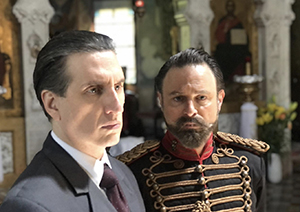I am 85% music and 15% man. ~Sergei Rachmaninoff
By Eric George Tauber


CINCINNATI, Ohio — Telling the story of someone’s life without turning it into a thick biography is the art of the raconteur. The art is to seize upon a single, defining moment and work from there. Maestro Hershey Felder takes us to the deathbed of the famed composer Sergei Vasilyevich Rachmaninoff in Nicholas, Anna & Sergei: A new musical film by Hershey Felder.
In March of 1943, just days before his 70th birthday, Rachmaninoff lay dying. He cannot speak, but the muscle memory in his hands has him playing the air like a piano. To ease his intense pain, the doctor gives him a shot of morphine while his doting wife Natalia reads to him from Pushkin. Ekaterina Siurina plays Natalia with great affection and devotion, singing with a soprano that soars as gracefully as a crane on a sea breeze.
Rachmaninoff’s physical body is in Beverly Hills, but his soul dwells in Russia, not Stalin’s Russia but Imperial Russia. In a morphine-induced hallucination, Felder recounts his life to Nicholas II, the last of the czars, because he embodies the only world the composer truly called home.
Like a character in a Chekhov play, Sergei Rachmaninoff was a blue blood with a fine pedigree and little money. Estranged from his divorced parents at a young age, he was sent away to a boarding school in Moscow. His music teacher, Sverev (which means “beast” in Russian) was the kind of abusive taskmaster that makes kids give it up for good. However, music was Rachmaninoff’s passion and destiny, inspiring him not just to play but compose.
Felder’s playing accompanies archival footage of the Bolshevik Revolution. Though blurred by time and limited technology, we can see in the Czar’s face the realization that his once glorious empire is crumbling. Likewise, Lenin’s smirk betrays a man who knows the day is his. Actor J Anthony Crane plays the czar not as a despot but as a gentle man who was in way over his head, forever haunted by deep regrets.
Rachmaninoff was fortunate to have the talent and connections to get him out of Russia. With limited resources, he hopscotched to Denmark, Switzerland, New York and finally, California. It was humbling and dispiriting, but he kept on playing and was later able to compose again.
Rumors of Anastasia’s survival excited imaginations and more than a few con-artists. Helen Farrell is suspiciously nervous as Anna Anderson, who claimed to be the lost princess. Rachmaninoff and others took her in and provided for her, suffering her violent outbursts and mood swings because they desperately wanted her to be who she professed to be. To them, Anastasia was more than a traumatized girl. She was a symbol of a lost world that they yearned to grasp even a vestige of.
None of the rumors of Anastasia’s survival turned out to be true. Yet Russia’s splendor is not in her royals but in her music. Tenor Charles Castronovo sings Tchaikovsky with tones that transport us back to that romantic world like a boat sailing down the Volga –minus the myriad starving peasants and activists languishing in gulags.
Hershey Felder takes us on a romantic voyage with a man who watched his whole world crumble, then rebuilt himself like a fiery phoenix rising from the ashes. To take this voyage and listen with the ears of one of Russia’s greatest composers, visit www.hersheyfelder.net.
*
Eric George Tauber, formerly of San Diego, is a Cincinnati-based freelance journalist specializing in coverage of the arts. Our music columnist Eileen Wingard also wrote a review of Nicholas, Anna & Sergei: A new musical film, which may be accessed here.
We miss you here in San Diego. Please come back!